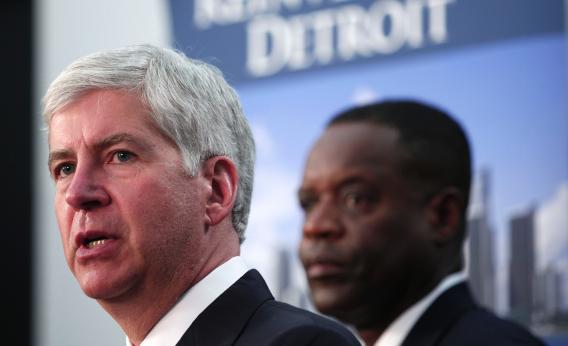This post previously appeared on Business Insider.
By Josh Barro
If a federal court approves Detroit’s bankruptcy plan, its retired workers will see their pension benefits cut drastically.
It shouldn’t be this way.
When a company goes bankrupt, most of its workers’ pension benefits are insured through the Pension Benefit Guaranty Corporation, a federal government entity established under the Employee Retirement Income Security Act of 1974. Congress should extend ERISA or a similar set of rules to municipal and state governments. This would force governments to manage their pension systems in a safe way, and would protect workers from destitution in the event of a state or municipal insolvency like Detroit’s.
ERISA reflects a reality of retirement: pensions are supposed to be super-safe investments, and they are too central to their holders’ retirement to simply allow them to be discharged in bankruptcy. But since federal insurance might encourage irresponsible behavior by pension sponsors, it comes with rules: companies must make prompt payments to ensure pensions are adequately funded, and they must pay fees to cover the cost of PBGC payouts.
ERISA has made corporate pensions more secure, but also more rare. Part of what companies liked about pension plans was the ability to use them as a slush fund: Make promises now, pay later, and leave workers holding the bag if you go bankrupt in the meantime. Once they were forced to pay upfront and invest responsibly, many corporations chose not to offer pensions at all. The share of private employees covered by pension funds has fallen by half since 1980.
Even as they has fallen out of favor in the private sector, traditional defined-benefit pensions have stayed dominant in the public sector. And as companies used to, governments routinely use them as slush funds, promising benefits and only paying into the funds to the extent it is convenient. In 2009, at the depth of the state fiscal crisis, just 61% of states and municipalities made at least 90% of the payment amount recommended by their pension actuaries. And often, the actuarial payment recommendation had already been massaged downward.
For example, Los Angeles and South Carolina both adopted new “smoothing” methodologies after the stock market crash of 2008-9 that delayed recognition of losses. This allowed them to overstate how funded their pension systems were, reducing how much they had to pay in. This accounting trick will relieve Los Angeles of the obligation to make $125 million in pension contributions during the coming fiscal year. Eric Garcetti, the newly elected mayor, had the balls to take credit for the massaging as a “pension savings” during his campaign.
Of course, fiddling with the numbers and delaying payments doesn’t reduce the cost of employee pensions, it just allows the bill to be paid later—and with interest. Most governments aren’t insolvent like Detroit, so usually retirees get paid in full and future taxpayers get stuck holding the bag. That’s probably what will happen in Los Angeles.
But sometimes, as in Rhode Island, lawmakers later reach the conclusion that they overpromised and then rescind already-promised benefits even though the government is not insolvent. When this happens, taxpayers and bondholders are the winners and retirees are the ones who lose out.
Today’s Wild West–style system where states and localities make up their own rules is not serving anybody’s interests reliably. An ERISA-like system for the public sector, where pensions are insured and governments must fund adequately and account honestly, would result in pensions that are more transparent, more reliable, and less generous.
It would mean that retirees, unlike Detroit’s, would be protected by a large cushion of dedicated pension assets in the event of municipal insolvency. In the event that cushion failed, the backstop of federal insurance would be available. And municipal officials would be less tempted to make big pension benefit promises as they would not have the option to put off paying their costs.
Conservatives won’t like this idea because it’s a big federal intrusion into state and local finances and it means a new federal guaranty of the pension benefits sought by public workers. All of that is true, but I don’t see a particular virtue in allowing states and localities to make big, costly and painful mistakes, and I don’t see allowing the mass abrogation of pension benefits as socially viable—which is why we got ERISA in the first place.
Liberals won’t like it because it will discourage the provision of defined benefit pensions. That’s also true, but I think the evidence is weak that DB pensions are an efficient tool for recruiting and retaining public workers. Maria Fitzpatrick’s study of Illinois teachers, finding that most were willing to pay only 19 cents on the dollar for a pension sweetener offered in 1998, especially suggests that officials are wasting taxpayer money by paying in benefits instead of cash.
There is a separate question of whether the government should provide pensions for paternalistic reasons even if workers do not value them highly. I agree the government should make paternalistic interventions to provide retirement security, but the federal government should do so for all workers, rather than states and localities doing so just for the public workforce. I’ve written before about why.
The situation in Detroit is a tragedy, for the city’s residents, its workers, and its bondholders. That’s what bankruptcy is for: sorting out the mess when everything goes to hell. A new ERISA-like law wouldn’t prevent cities like Detroit from falling into the fiscal abyss, but it would prevent them from borrowing from their retirees along the way, and would ensure retirees don’t end up destitute as a result.
SEE ALSO: 11 Charts That Show Why Detroit Is Falling Apart And Heading For Bankruptcy
